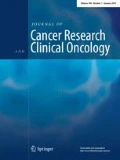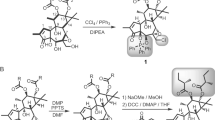Abstract
Alkylphosphocholines are a new class of anticancer agents. Their mode of action is considered to be related to the inhibition of phospholipase C and protein kinase C. These enzymes play a major role in intracellular signalling pathways. Their inhibition by alkylphosphocholines leads in the dimethylbenzanthracene-induced mammary carcinoma of the rat to a response pattern similar to that of the antiestrogen zindoxifene. This suggests that the inhibition of transcription factor formation might be the common pathway for alkylphosphocholines and antihormones. Based on the experimental dose-response pattern, new clinical strategies for dose finding and response evaluation will have to be developed for inhibitors of signal transduction, such as alkylphosphocholines.
Similar content being viewed by others
References
Beckers T, Voegeli R (1994) Molecular targets of miltefosine. In: Hilgard P, Engel J (eds) Clinical aspects of miltefosine and its topical formulation Miltex®. Drugs Today 30 [Suppl B]
Evans RM (1988) The steroid and thyroid hormone receptor superfamily. Science 240:889–895
Gibbs JB, Cliff A (1994) Pharmaceutical research in molecular oncology. Cell 79:193–198
Grunicke H (1995) Signal transduction mechanisms in cancer. Landes, Austin
Hilgard P, Stekar J, Wuttke W, Elliger M, Holtei W (1988) Comparative pharmacology of zindoxifene and tamoxifen. Prog Cancer Res Ther 35:369–373
Hilgard P, Stekar J, Voegeli R, Harleman JH (1992) Experimental therapeutic studies with miltefosine in rats and mice. In: Eibl H, Hilgard P, Unger C (eds) Alkylphosphocholines: new drugs in cancer therapy. Prog Exp Tumor Res 34: 98–115
Michna H, Schneider MR, Nishino Y, El Etrebi MF (1989) The antitumor mechanism of progesterone antagonists is a receptor mediated antiproliferative effect by induction of terminal cell death. J Steroid Biochem 34:447–453
Minana MD, Felipo V, Grisolia S (1990) Inhibition of protein kinase C induces differentiation in Neuro-2a-cells. Proc Natl Acad Sci USA 87:4335–4339
Reissmann T, Engel J, Kutscher B, Bernd M, Hilgard P, Peukert M, Szelenyi I, Reichert S, Gonzalez-Barcena D, Nieschlag E, Comaru-Schally AM, Schally AV (1994) Cetrorelix. Drugs Future 19:228–237
Unger C (1996) Current concepts of treatment in medical oncology: new anticancer drugs. J Cancer Res Clin Oncol 122:189–198
Author information
Authors and Affiliations
Rights and permissions
About this article
Cite this article
Hilgard, P., Pohl, J. & Engel, J. The development of alkylphosphocholines as signal transduction inhibitors: experimental and clinical challenges. J Cancer Res Clin Oncol 123, 286–287 (1997). https://doi.org/10.1007/BF01208640
Received:
Accepted:
Issue Date:
DOI: https://doi.org/10.1007/BF01208640




